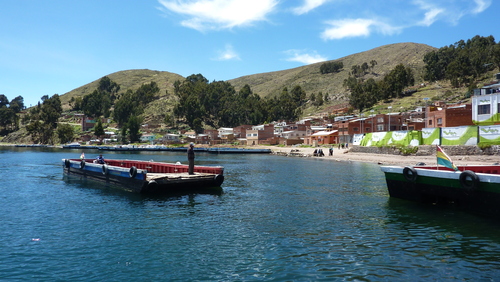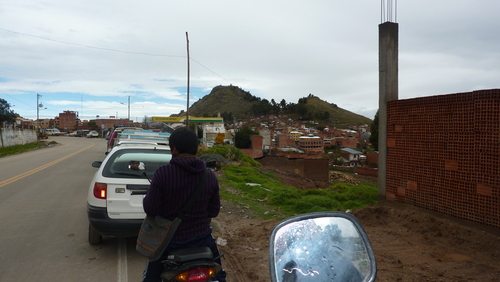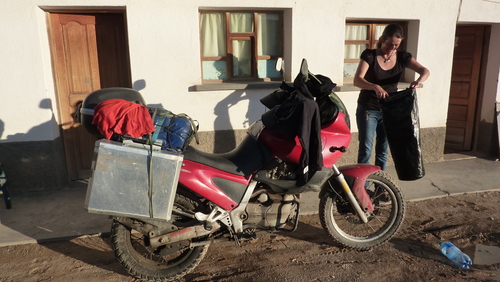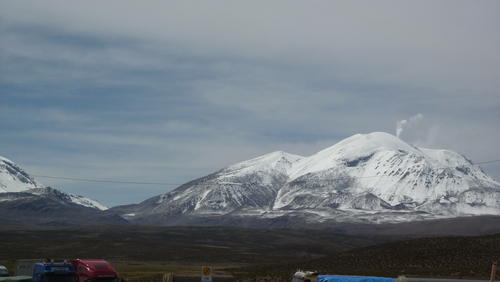It's not for you, Peru
The day started so well.
The sun was shining, the sky was a deep blue dotted with white fluffy clouds and lake Titicaca shimmered.

On top of this we had a full tank of gas. The "maybe tomorrow" had actually happened at the only gas station in town. After joining the long queue and causing a longer one all the paper work was filled out for foreign vehicle fuel purchase ( 2 forms, 2 different rates, names and passport details). We managed to put 17.25 litres into a 17 litre tank. So, I don't think we even had that 10kms available after all.
It was only 8kms to Peru, we breezed through the Bolivian immigration, smiled at the customs officers who 2 years previously had closed early as they saw us approach, and parked the bike in no mans land.
The Peruvian officials guided us through getting stamped in and pointed us at the aduana for the bike.
Then it all fell apart.
The bike is still in Juan's name, we have been traveling on a notary/solicitors letter giving us authorisation from Juan to take 'his' bike across borders. It specifically states "Argentina, Bolivia and Peru". This was not good enough this time. It had to be in the name of the rider crossing the border. It was against the law for it to be brought into Peru.
No amount of "how can we sort this?", "Is there something we can do?" (hinting that we were prepared to pay, but not use the word 'bribe') would make him change his mind. He was incorruptible, a credit to his country.
We had entered Peru, but the bike was "persona non grata".
Fine, nothing for it but to go back to Bolivia. We went back to the immigration office and requested an exit stamp.
"No, manana (tomorrow)", said the previously helpful official.
"Que ?" I said, "manana" he replied".
"Why? Why not?" I repeated. "Tomorrow" he reaffirmed. Legally, once stamped into Peru you have to stay for 24 hours before you are allowed to leave again.
I explained about the bike sitting in no mans land, the wrong side of the barrier, and that we needed to return to Bolivia. "No, manana".
I may have sworn a bit now.
Coming over all British, we decided it was best to ask a policeman. We marched purposefully over the road in our bike gear, introduced ourselves and explained what was happening. He indicated it was not a problem and asked us to follow him to he "Justice Police". Here we had our visas stamped with a 'negated', returned to 'Mr Manana' who now happily stamped us out.
So now us and the bike were in no mans land.
Great, but what if we have similar problems 500m down the road getting back in Bolivia ?
The Bolivians were surprised to see us back so soon, but once we explained how the Peruvians did not want our money and that we would spend it here instead they stamped us back in. The customs had not processed our bike paperwork yet and happily handed it back as if we had never left.
What now ? Stop over at Copacabana and make new plans ?
Head up the east side of the Lake for 2 days to see if we can get across at the little border post there ?
Try for the main border crossing, Deseguardero, about 6 hours ride, and be refused again ?
Jean stated the obvious, the sun was out, and there wasn't any rain: "lets head for Chile and get past El Alto while it is dry".
There was no doubt the bike could return to Chile, but the crossing was more than a days ride. And of course we had to face El Alto for a 3rd time. Have I mentioned how much we hate this part of the route ?
Armed with a freshly filled 'fuel can' in Copacabana (same gas station, no form filling today) we hit the road.
In the dry El Alto was much easier, Jean rode shotgun banging on the side of collectivos that tried to muscle in on our space while I performed 'imaginative' manoeuvering in non-existent gaps and joined in the ignoring of red traffic lights. A doddle in the dry, without rain and hail, a mere 40 minutes.
The fuel situation raised its head again, once more we were being refused gas. But we persisted, popped into all the gas stations we passed, and eventually managed a fill before we got to our days destination at Patacmaya. So in a 100k radius around La Paz no one would serve fuel to foreigners.
Patacamaya is a small town on the main La Paz to Oruro route, with the road to the Chilean border bisecting it. We had noted previously it had 2 gas stations and a lot of Alojamientos (small, cheap rooms for rent).
Neither gas station had petrol.
It is 380kms to Arica, 190Kms to the border. We filled our tank with the spare fuel.
We walked the entire length of the town asking for a room, everywhere was full. We were beginning to think this was a racist thing until we realised all the truckers in town and the workers on the new dual carriage way also needed somewhere to stay.
Finally we found somewhere with a room, and parking for the bike. The room opened straight onto a wet dirt yard (the 'car park') with piles of rubbish at one end. It was a bare concrete floored room with 2 beds and a window covered with a stained plastic curtain. The shared toilet next door to the room was also a public one. The yard was shared with dogs, cats, chickens, and flies. The flies would dart into the room as soon as the door opened to escape the heat. There was no electricity in the entire town. We had an early night.

At 0530 we were awoken by knocks on doors and shouts of "arriba, arriba", we assumed early morning wake up calls for the workers.
By 0630 we were packed and on the road, it was already busy with people everywhere, boarding buses and collectivos. Neither gas station was selling petrol still, this may have been because there was still no electricity and they could not pump it.
Stuff it, we knew that there was a gas station at the border from our previous trip. If it had no gas, or was not there anymore we would see how far we could get. And if needed, hitch down to Arica for more fuel.
It was time to ride economically again. I could manage 250-280kms on a tank. After the border it was all down hill.
Once more we were lucky, the skies were clear and the ride across the Altiplano towards the snow capped mountains and a smoldering volcano was smooth and easy for the bike. Also the gas station was open and would sell to us.

For a final twist on our descent from 4700m to sea level, over 200kms on twisty poorly maintained roads, the bike decided to pop a front fork seal and spewed oil all over the front tyre just before the Chilean border post at the top.
Now we are at the beach, in the warm and dry, with a bike that can't go anywhere until we find a mechanic prepared to repair the fork 3 days before Christmas. But at least the bike has a tank full of petrol.
It looks like Xmas in Arica. Not a hardship.
